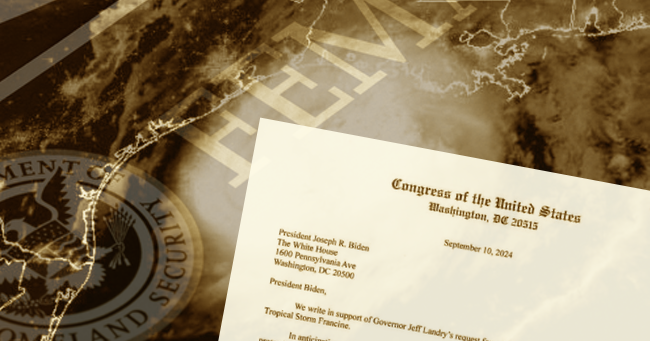Ballot Delays
Kyle Ingram, The News & Observer, 9/10/24
The North Carolina Supreme Court ruled Monday that the state must remove Robert F. Kennedy Jr. from the presidential ballot, which will likely delay the mailing of absentee ballots by several weeks.
The court ruled 4-3 in favor of Kennedy, who sued to have his name removed after suspending his candidacy and endorsing former President Donald Trump last month.
“We acknowledge that expediting the process of printing new ballots will require considerable time and effort by our election officials and significant expense to the state,” the majority opinion, authored by Justice Trey Allen, said. “But that is a price the North Carolina Constitution expects us to incur to protect voters’ fundamental right to vote their conscience and have that vote count.”
Justices Anita Earls and Allison Riggs, the court’s two Democrats, dissented, as did Republican Justice Richard Dietz.
“Here, the whims of one man have been elevated above the constitutional interests of tens of thousands of North Carolina voters who have requested an absentee ballot and seek to exercise their right, under North Carolina law, to cast their ballot as soon as possible,” Riggs wrote in her dissent.
After having already printed millions of ballots with Kennedy’s name on them, local governments will now have to spend hundreds of thousands of dollars to reprint those ballots without his name.
In her dissent, Earls noted that it is counties who will bear the financial brunt of this decision — not the state. Absentee ballots were supposed to be sent on Friday to the over 130,000 voters who requested them, but an unsigned ruling from the Court of Appeals in Kennedy’s favor forced the state to halt ballot mailing.
Now, voters will have to wait several more weeks to get their mail-in ballots, reducing the state’s absentee voting period, which was one of the longest in the country.
“We will continue to consult with counties and ballot vendors to determine the feasible start date for distributing absentee ballots statewide,” Karen Brinson Bell, executive director of the State Board of Elections, said in a press release on Tuesday. “…This decision imposes a tremendous hardship on our county boards, at an extremely busy time. But our election officials are professionals, and I have no doubt we will rise to the challenge.”
The state also runs the risk of missing the federal deadline for sending out absentee ballots, which is Sept. 21. Brinson Bell said the board has begun discussions with the U.S. Department of Defense about seeking a potential waiver of that deadline.
In its ruling, the court’s majority reasoned that having Kennedy on the ballot “could disenfranchise countless voters who mistakenly believe that plaintiff remains a candidate for office.”
The dissenting justices, however, noted that state law gives the State Board of Elections the discretion to decide on late changes to ballots.“Today, any public aspersions cast on the impartiality, independence, and dignity of our state courts are well-earned,” Riggs wrote. “I despair of this court’s current failure to engage in plain reading of the law and its failure to forcefully defend the rights of the people, particularly when it comes to participation in the political process.”
The Supreme Court’s decision is likely the final step in a months-long saga over Kennedy’s candidacy. After spending months fighting to get on North Carolina’s ballot — and defending his right to do so in court — Kennedy launched a hasty attempt to withdraw his candidacy after partially suspending his campaign last month.
The State Board of Elections initially denied Kennedy’s request to be removed from the ballot. The board’s Democratic majority decided that it would be impractical to do so since over half of the state’s counties had already printed ballots and reprinting them would force the state to miss the Sept. 6 deadline for mailing them out. Kennedy sued shortly after, arguing that the board was statutorily required to remove him and, by forcing him to remain on the ballot, they were compelling his speech in violation of the Constitution.
A Wake County Superior Court judge sided with the state, finding that they would suffer substantial harm by having to reprint all of the ballots and miss the statutory deadline. However, she granted a 24-hour stay of her decision, allowing Kennedy to appeal just hours before ballots were supposed to go out.
The Court of Appeals sided with Kennedy and ordered the state board not to send out any absentee ballots with his name on them. The board appealed to the Supreme Court, asking them to reverse the decision and allow them to immediately mail out the already-printed ballots.
“The state — and our taxpayers — may have to spend upwards of $1 million undertaking the numerous tasks it takes to reprint ballots,” the board’s lawyers wrote. “Our state’s elections officials will have to work around the clock and on weekends to reformat, reprint, and reassemble ballots. Absentee voters — including members of our military — will have significantly less time to receive their ballots, fill them out, and return them.”
In court filings, Kennedy’s lawyers said the state should have begun preparing to remove him from the ballot the day he announced he was suspending his campaign, which was Aug. 23.
The majority agreed, writing that “to a large extend, any harm suffered by defendants… is of their own making.” However, during Kennedy’s announcement, he said he would seek to be removed from the ballot in some states, but remain on the ballot in others. He did not specifically mention his plans for North Carolina.
In his dissent, Dietz notes that, even if the board had begun removing Kennedy’s name the day he announced he was suspending his campaign, they still would likely have missed the Sept. 6 statutory deadline for sending out the ballots. “In my view, the inability to comply with this legal deadline was a valid basis for the board’s determination of impracticality,” he wrote.
County election workers will now have to recode over 2,000 different ballot styles and disregard the millions of ballots which had already been printed. In a concurring opinion, Justice Phil Berger Jr. said the previously printed ballots with Kennedy’s name on them should be destroyed. In an affidavit to the court, State Board of Elections Executive Director Karen Brinson Bell estimated it would take a minimum of 18 to 23 days to create the new ballots. [Source]
Video Game Support
Dan Kane, The News & Observer, 9/10/24
Since 2020, state lawmakers have spent millions to put a private company’s science-based video game in North Carolina public schools even though few students are playing. Demand for the Plasma Games product has remained low, state education officials say, even after the company dangled a chance at a free cruise for teachers and administrators who bumped up participation.
All told, legislators have committed $9.8 million to a pot of money public schools can use to purchase company game licenses, despite state Department of Public Instruction officials saying schools couldn’t show the game is improving student learning.
After state education officials recommended to the NC General Assembly in May that the pilot program be ended, a top state House budget writer attempted to move the project from the education agency’s oversight and continue its funding, documents show.
Plasma Games has a notable investor – the wife of Republican state Supreme Court Chief Justice Paul Newby. It has also had persistent support from House budget writers.
Newby’s statements of economic interest show that Macon Newby has had an investment of $10,000 or more in Plasma Games since 2020, the year that lawmakers first appropriated money for the Raleigh-based company.
Hunter Moore, who is not related to the House speaker, started Plasma Games in 2013 under the name of Athena’s Compass, state incorporation records show. He had worked for several technology companies, including IBM and Boeing, before going to UNC-Chapel Hill to earn an MBA and “build a company that would improve our economy, national defense, and our children’s future by revolutionizing STEM education,” the company website says.
Moore and several others developed the “SciOps: Global Defense” video game, the company’s patent application shows. Students who sign on play scientists fighting evil aliens who have come to sap Earth’s energy resources and destroy the environment. While battling back, students are intended to learn about science – how lasers work, for example, or what materials make the best protective armor. The gaming platform includes lesson plans and printed materials teachers can use.
Plasma Games first hired lobbyists registered with the state in 2018, state records show. In 2019, Rep. Linda Johnson, a Kannapolis Republican and fellow top budget writer Rep. Jason Saine of Lincolnton filed a bill that proposed spending $3 million on a pilot program for the company’s gaming platform in up to 25 school districts in mostly rural areas. Rep. Craig Horn, a Union County Republican and chairman of the House Education Appropriations Subcommittee, was a co-sponsor. The legislation never made it out of the House Rules committee to reach a floor vote.
The following year, after Newby’s economic interest statement listed his wife as an investor for the first time, lawmakers included $2.5 million for the Plasma Games pilot program in a COVID relief bill.
School districts could draw money from the program to pay for licenses to play the SciOps game. The company charged $6,000 per teacher, who could then give an unlimited number of students access to the game, a commerce report said. The commerce department told lawmakers in a written report a year later, in 2021, that 20 school districts participated, but roughly half of the 498 teachers who had received licenses for the game had not activated them in time to provide feedback. For those who did, the results were mixed, the report showed.
One teacher reported the game was “very engaging,” while another said students found it “braindead,” “boring,” and “stupid.”
Female students showed less interest than males, one teacher said, which mirrors how video games fare among teens in society, according to Pew Charitable Trust research. School administrators generally said in the report they liked the program, but they wanted the state to continue paying for it.
State lawmakers continued funding the Plasma Games pilot, but they moved it to the Department of Public Instruction. They allocated another $2.5 million that year in the 628-page state budget for the program, spending first visible in the House’s version of the budget.
The State Board of Education authorized districts and charter schools to pay Plasma Games $60 per student for a license, but the company also told districts and charter schools they could pay a $48,000 license that covered all of their students, DPI officials said.
Interest in the game among students and teachers showed little improvement, DPI said in a May 2023 report to lawmakers. Nearly 80 percent of licenses to use the game, costing a total of $1.4 million, were not activated.
During that school year, the company tried to boost participation by offering school administrators and teachers a chance to win a cruise for two if they could get 85% of their students to play the game and fill out a survey, correspondence DPI received from two school districts showed. DPI also reported the company offered students a chance to win $1,000 scholarships for playing the game.
DPI officials questioned those tactics as they might skew the true interest in the product, Michael Maher, a deputy superintendent said in the interview. “What we are seeing in essence with this program is that districts apply for it because the money is available,” Maher said in an interview in August. “But people aren’t using it and they are not using it in a meaningful way and we don’t have a real way to evaluate whether or not it works.”
Despite the problems DPI officials reported in the 2023 report, state lawmakers agreed to a House budget proposal to up the spending to $3 million that year, with another $1.8 million for this year.
Rep. John Torbett and Plasma Games CEO, Moore told the DPI officials that the company should be paid the $48,000 per school district or charter school annual fee, as opposed to the $60 per student fee that was more closely tied to usage, Maher said. “I expressed to Rep. Torbett that part of my obligation is to be a good steward of taxpayer dollars, and that did not feel to me like I would be fulfilling that obligation,” Maher said. Torbett’s response, Maher said, was “they are owed this money. They had been appropriated it and they should get it.”
Like Hunter Moore and Supreme Court Chief Justice Paul Newby, Torbett, a Gaston County Republican, did not respond to requests to be interviewed about Plasma Games. [Source]
Guilford Appointment
Kevin Griffin, Greensboro News & Record, 9/10/24
Guilford County Republican leaders selected John Blust to fill the vacancy left by Rep. John Faircloth during a meeting on Monday, according to a release from the party. Blust will now serve out the remaining months of Faircloth’s term representing N.C. House District 62, which is located in northwest and western Guilford County.
Blust, who works as an attorney in Greensboro, is no stranger to the N.C. General Assembly, having previously served nine terms in the N.C. House and a brief stint in the N.C. Senate. He chose not to seek re-election in 2018.
“It’s a great honor and I’ll give it my dead-level best and try to approach high office with wisdom and humility,” Blust said following his selection.
Under North Carolina state law, officials within the county party of the vacating legislator are responsible for choosing the person to fill the unexpired term. While Democratic Gov. Roy Cooper is technically responsible for making the appointment, the law requires he appoints the person chosen by the local party.
Faircloth, who at 85 was the oldest serving member of the House, announced his resignation in August with an effective date of Friday. His legislative assistant said he was leaving office early for personal reasons but declined to elaborate.
This is the third time this year Guilford County party officials have had to fill a vacancy in the N.C. House, following the resignations of Republican Rep. Jon Hardister and Democratic Rep. Ashton Clemmons, respectively.
Faircloth opted not to seek re-election this year. Now Blust will go into the Nov. 5 general election as the incumbent against Democrat Marjorie Benbow. [Source]
Defense Attorneys
William Tong, The News & Observer, 9/10/24
Attorney Tonza Ruffin has litigated criminal defense cases for 24 years, often serving indigent clients who can’t afford to hire their own lawyer. In June 2016, North Carolina’s Indigent Defense Services Office ran out of money to pay Ruffin — then a private attorney — and hundreds like her who were taking court-appointed cases. The state had to eventually pay them using money from the following year’s budget. Ruffin said she doesn’t remember that specific pay freeze because, at the time, billing issues often delayed her getting paid. Still, pay freezes have hurt the indigent defense field, she said. “Attorneys can’t survive with nothing,” said Ruffin, now chief public defender for Bertie, Halifax, Hertford and Northampton counties. “What we find is that private appointed counsel gets frustrated, and they say, ‘I can’t do this.’”
Eight years later, the IDS office faces a similar funding cliff. It predicts a roughly $39 million budget shortfall later this fiscal year in its private assigned counsel (PAC) fund, according to Aug. 9 IDS commission meeting documents. That’s based on an expected $108 million in expenditures in fiscal 2025 for court-appointed private attorneys, which follows a steady increase in PAC spending since 2021. On its current trajectory, the PAC fund could run out of money by April or May, IDS executive director Mary Pollard said. In that scenario, the statewide agency wouldn’t be able to pay private counsel until it receives more money in July.
“I’m afraid that if we do have a shortfall in the spring and we’re unable to make payments, that we’re going to lose the few remaining lawyers we have who are willing to do the work,” Pollard said. The current projected shortfall is a worst-case scenario, said Pollard, who’s hopeful the legislature will provide more money before the fund runs out. While the state House passed a budget adjustment in the last legislative session that would have included more money for IDS, disagreements with the Senate meant no final bill cleared both chambers.
State Rep. Marcia Morey, a Durham Democrat and former judge, said it’s possible the legislature could fund IDS more in the case of an “emergency.” But State Rep. Ted Davis, a Wilmington Republican and co-chair of the Justice and Public Safety Appropriations committee, said he hasn’t heard of a projected IDS shortfall. “No need to talk about it until I know that a potential problem actually exists,” Davis wrote The News & Observer in response to an interview request.
Republican State Reps. Dudley Greene, Charles Miller and Carson Smith, the other Justice and Public Safety Appropriations co-chairs, did not respond to The N&O’s emails or phone calls about IDS funding. Morey, who sits on the committee, also hasn’t heard legislators talk about providing more money. “It’s not discretionary; it’s mandatory,” Morey said, referencing defendants’ constitutional right to legal representation. “We need to foot the bill.” [Source]
Debate Spin
Danielle Battaglia, McClatchy, 9/10/24
Gov. Roy Cooper planned to be in the spin room Tuesday night as Vice President Kamala Harris and former President Donald Trump face off in a debate hosted by ABC.
“He’s going in his role as a top surrogate and somebody who believes in the leadership of the vice president and the visions she has for the country,” said Ford Porter, Cooper’s communications director, who confirmed his role to McClatchy. “That’s what he’s doing up there.”
Tuesday’s debate in Philadelphia is expected to draw a larger than usual audience. It will be the first time Trump and Harris meet on the national stage. Cooper and Harris have a relationship that stretches back over a decade when they both served as attorneys general of their states.
They’ve continued that relationship as Harris became a senator and eventually vice president and Cooper became governor. It was Cooper who introduced Harris at the Democratic National Convention just before she accepted her party’s nomination for president. Cooper has repeatedly said he believes Harris can pull off the first win in North Carolina of a Democratic candidate for president since Barack Obama in 2008. [Source]
Childcare Funding
Grace Vitaglione, NC Health News, 9/11/24
Child care took center stage at the legislature this past year, as advocates sounded the alarm about potential closures and/or price hikes when federal funding dried up in July. But the issue of affordable and accessible child care has been around for far longer. Public funding for child care in North Carolina stagnated for a decade before the pandemic. That’s part of why the sector’s in crisis now, advocates say. “This has been a problem that’s been smoldering for over a decade, and the pandemic threw gas on it, and now we have a crisis,” said Sherry Melton, lobbyist and consultant for the NC Licensed Child Care Association.
In June, state lawmakers agreed at the last minute to direct about $67 million to keep child care providers afloat for about six months. House Speaker Tim Moore, R-Cleveland, said at the time that the rest of the funding would come through in January.
“When it comes to child care, this is a key thing that we need to fund because we know we need a workforce,” Moore told reporters in June. “There are mostly women that are affected by this, but some men as well who cannot enter the workforce because they cannot afford or do not have access to child care.”
But this week, though lawmakers have been back in Raleigh to do a budget update, child care has not been on the table.
Most states, including North Carolina, primarily support child care with federal funds and supplement it with state money, Melton said. But neither federal nor state dollars have kept up with higher costs. In recent years, funding increases from North Carolina’s lawmakers have been “incremental and gradual and not enough,” she argued.
Public money for child care in North Carolina usually flows into specific programs. This ensures that child care providers have multiple avenues for support, according to Ariel Ford, who just stepped down as the director of the Division of Child Development and Early Education at the N.C. Department of Health and Human Services.
There hasn’t been a large state investment in early childhood education since the early 2000s, Ford said. And while federal money has increased, she said it’s not increased nearly enough.
In the 2011-12 biennium, when Republicans took over the state legislature, leadership said that one of their main priorities was to cut spending, as reported by multiple outlets at the time. The state legislature overrode a veto by then-Gov. Bev Perdue and made around a 20 percent budget cut to Smart Start and NC Pre-K (then called More at Four), EducationWeek reported. That was the beginning of flat funding in the state for child care, Ford said.
For example, Smart Start saw a cut of more than $30 million in the budget appropriations from 2010-11 to 2011-12, according to the organization’s 2012-13 annual report.
Having multiple sources of child care subsidy, and differing eligibility criteria, can be complicated. Smart Start Chief Strategy Officer Safiyah Jackson said it can be difficult for parents to figure out where and how to access help, but that Smart Start can serve as a “lighthouse” to direct them to resources in their community.
Smart Start is a comprehensive approach to early childhood from birth to age 5, Jackson said. It is primarily funded by allocations from the state legislature, with some private dollars added on — usually about a 15 percent match. The program is not just child care support, it’s also made up of child and family health programs. But most of their funding does go to early childhood education. What also is confusing is that the term “Smart Start” refers to the network as a whole, which is made up of the NC Partnership for Children — a statewide agency — along with 75 local, county-based partnerships with independent nonprofits that help children.
About half of the overall Smart Start network’s budget goes to subsidies to help families pay for child care; each local partnership distributes those dollars within the community, Jackson said. That’s separate from the state child care subsidy program, which goes through the DHHS Division of Child Development and Early Education.
During the dark days of the pandemic, funding for child care was a rare bright spot. Typically, federal support for child care to North Carolina runs at about $400 million a year, but that grew to about $1.3 billion a year as a result of the American Rescue Plan Act, Ford said. Those funds allowed the centers to bump up teacher pay, hire more teachers and even provide people with benefits, sometimes for the first time.
More recently, state lawmakers prioritized more funding for child care. In fiscal year 2024-25, the state budget for the child care subsidy program jumped to $150.5 million, according to the Fiscal Research Division.
State lawmakers also directed almost $1 million in funding to the NC Tri-Share Child Care Pilot Program in 2023, in which employers, eligible employees and the state equally split the price of child care for working families. That’s becoming an additional avenue for families to apply for a child care subsidy, but the pilot is only available in select counties.
More recently, state lawmakers prioritized more funding for child care. In fiscal year 2024-25, the state budget for the child care subsidy program jumped to $150.5 million, according to the Fiscal Research Division.
But those extra federal dollars for child care came to an end this past summer, prompting something of a crisis for many child care centers. The end of those dollars prompted a flurry of advocacy activity this past summer, where providers, parents and business leaders all pushed lawmakers for money to maintain child care funding.
State lawmakers responded with an additional $67.5 million to make up for some disappearing federal pandemic-era dollars. According to advocates, it wasn’t nearly enough.
Lauren Horsch, spokesperson for Senate Leader Phil Berger, R-Rockingham, wrote in an email that the state “would not be in this situation had Congress not pumped tens of billions of dollars into states and then pulled the rug out from under them.”
“Addressing the childcare needs in North Carolina is going to take more than just money, and simply having the government subsidize childcare is not a long-term solution,” she said. “Conversations about the role of the business community and any potential policy solutions will undoubtedly take place as legislators prepare for next year’s long session.” [Source]
Cannabis Sales
Lilly Knoepp, BPR News, 9/09/24
This weekend, a pocket of North Carolina became the first in the Southeast to have legal recreational marijuana sales. General Manager of Qualla Enterprises Forrest Parker said over 4,000 people were served at the dispensary during opening weekend.
“It was just an absolutely humbling and insane turnout,” Parker told BPR on Monday.
Long before the doors of the Great Smoky Cannabis Company opened at 10 a.m. on Saturday, a line with hundreds of people snaked through the dispensary’s parking lot in Cherokee.
Dispensary workers with the Eastern Band of Cherokee tribe started checking IDs and lining up the first 40 customers so that the recreational marijuana purchases could take place when the clock struck ten. Once the doors opened, the crowd outside continued to grow – with nearly 1,000 people waiting in a line that eventually crossed Paint Town Road. Saturday’s celebration of the first legal recreational marijuana sales in North Carolina came just three years after the Eastern Band of Cherokee first approved opening a retail dispensary for medical cannabis.
The Eastern Band of Cherokee is able to sell marijuana as a sovereign tribal nation but as soon as a customer steps off of tribal lands it is illegal to possess marijuana, according to state and federal laws. In 2023, the tribe voted to allow the legal sale of recreational marijuana. This followed a 2021 decision to sell medical marijuana. That vote launched the creation of Qualla Enterprises, the tribe’s cannabis company, which operates the cannabis farm and the dispensary.
The dispensary brought in a high-profile guest for the occasion. Nathan Apadoca aka Dogg Face went viral four years ago when a video showed him vibing on a skateboard while listening to Fleetwood Mac and drinking cranberry juice. “Legalization of weed should be everywhere worldwide,” Apadoca said Saturday. Apadoca says he’s a lifelong stoner. He is also a Native Mexican and part of the Northern Arapaho tribe. He says it is important to support Native cannabis ventures.
Tribal Council member Tom Wahnetah (Yellowhill) is the liaison between Qualla Enterprises and tribal council. Wahnetah said expanding dispensary sales through recreational marijuana is a crucial part of the tribe’s economy. “It’s very important because gaming has popped up all over Tennessee, Virginia and probably soon in South Carolina and Georgia. So we have to diversify more our revenue streams to support our people in our programs,” Wahnetah said. [Source]
Governor’s Poll
Paul Specht, WRAL News, 9/10/24
Democratic Attorney General Josh Stein holds a commanding lead over Republican Lt. Gov. Mark Robinson in North Carolina’s gubernatorial race less than two months before the November, according to a new WRAL News Poll that shows Stein making gains with women, conservatives and rural voters.
Overall, 51% of likely November voters support Stein and 37% support Robinson, with 11% undecided, according to the WRAL News Poll of 676 likely voters, which was released Tuesday. The gap has widened significantly since March, when the previous WRAL News Poll showed Stein with a 44%-to-42% lead over Robinson.
The latest poll, conducted in partnership with independent pollster SurveyUSA between Sept. 4 and Sept. 7, reported a credibility interval of plus or minus 4.9 percentage points. A credibility interval is similar to a margin of error but takes into account more factors and is considered by some pollsters to be a more accurate measurement of statistical certainty. Polls have consistently shown Stein leading the race, with his lead varying between 4 and 14 percentage points.
Prior to the WRAL News Poll, a survey by High Point University also showed Stein with a 14-point lead. The WRAL poll found Stein leading with men and women, young and moderate voters. He has also picked up support among conservatives since March. Twenty percent of conservative voters supported Stein in the latest WRAL poll, up from 14% in the March poll.
Stein is also outperforming other Democratic candidates when it comes to conservative supporters: Twelve percent of conservative voters support Democratic state superintendent candidate Mo Green, while Democratic attorney general candidate Jeff Jackson had 14% support among likely voters who identified as conservative. It was also slightly better than Democratic presidential candidate Kamala Harris, who had 19% support from conservative North Carolina voters.
North Carolina voters often split their tickets. In recent years, the state has tilted in favor of a Republican presidential candidate and a Democratic gubernatorial candidate. While 90% of Harris voters say they plan to vote for Stein, 77% of Trump voters say they’ll vote for Robinson. Eleven percent of Trump supporters say they’ll vote for Stein in the gubernatorial race. Harris has slight edge in neck-and-neck race with Trump in NC, WRAL News Poll shows. [Source] |





 Save the Date
Save the Date